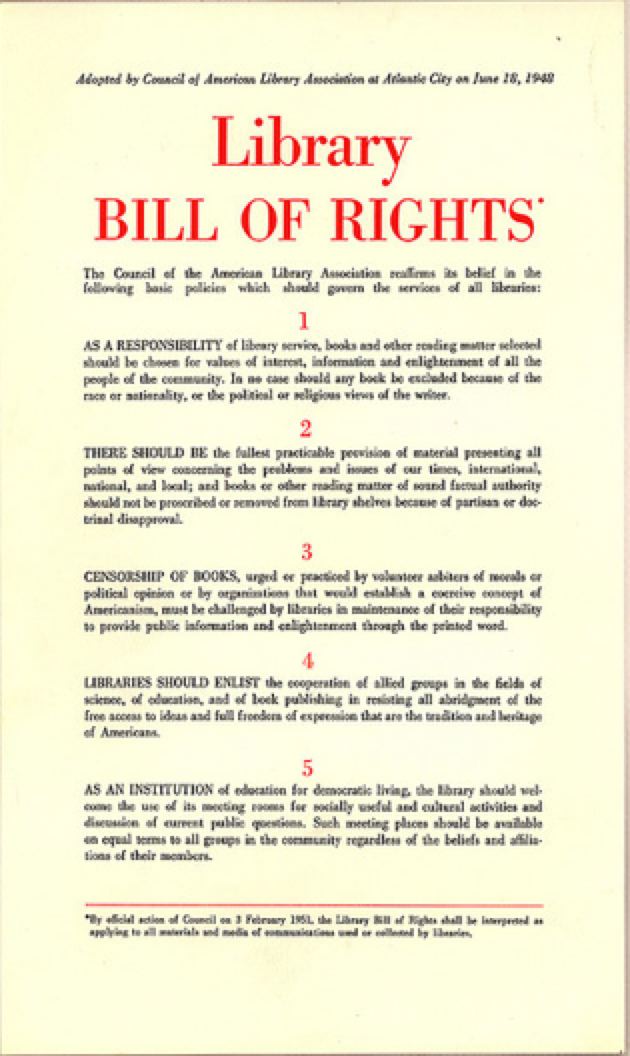June 18: American Library Association Adopts “Library Bill of Rights” (1948)
 It was on this date, June 18, 1948, that the American Library Association adopted its “Library Bill of Rights,”* an affirmation that libraries are charged with providing the information and ideas necessary for an informed populace and a vibrant democracy. It has been amended twice since 1948 and its current version is still less than 200 words. The “Library Bill of Rights” exhorts each library to select and to make available its information and facilities without prejudice for or against religious or political correctness, to represent a diversity of viewpoints in the materials provided, to challenge censorship and to ally with groups promoting free expression.
It was on this date, June 18, 1948, that the American Library Association adopted its “Library Bill of Rights,”* an affirmation that libraries are charged with providing the information and ideas necessary for an informed populace and a vibrant democracy. It has been amended twice since 1948 and its current version is still less than 200 words. The “Library Bill of Rights” exhorts each library to select and to make available its information and facilities without prejudice for or against religious or political correctness, to represent a diversity of viewpoints in the materials provided, to challenge censorship and to ally with groups promoting free expression.
When librarians receive a complaint about items in the collection, instead of defending or removing the material, the protester is asked to suggest something to add that would provide balance to the library collection. This represents a more mature attitude toward suppression of alternative viewpoints often sought by religious groups. The answer to speech considered offensive is not suppression but facilitation: that is, more speech, not less.
So when one library posted a sign saying, “We guarantee that there is something in this library to offend everyone” it might have been better, not to mention more consistent with the ALA's guiding philosophy, had it read, “We guarantee that there is something in this library to offend and to please everyone.” There is no better way to encourage critical thought than by exposure to a rainbow of viewpoints.
But the “Library Bill of Rights” was adopted in a pre-Internet, pre-CIPA† era, when children could be much more easily protected from bad things. The only trouble is agreeing on what constitutes “bad things”: do we make all libraries safe for children? Then they become nearly useless for adults. The ALA addressed this quandary in the “Library Bill of Rights” and firmly advocates open access, and no Internet filtering, for children. This is consistent with the library mission of dispensing information, not restricting it.
Library Bill of Rights
The American Library Association affirms that all libraries are forums for information and ideas, and that the following basic policies should guide their services.
I. Books and other library resources should be provided for the interest, information, and enlightenment of all people of the community the library serves. Materials should not be excluded because of the origin, background, or views of those contributing to their creation.
II. Libraries should provide materials and information presenting all points of view on current and historical issues. Materials should not be proscribed or removed because of partisan or doctrinal disapproval.
III. Libraries should challenge censorship in the fulfillment of their responsibility to provide information and enlightenment.
IV. Libraries should cooperate with all persons and groups concerned with resisting abridgment of free expression and free access to ideas.
V. A person's right to use a library should not be denied or abridged because of origin, age, background, or views.
VI. Libraries which make exhibit spaces and meeting rooms available to the public they serve should make such facilities available on an equitable basis, regardless of the beliefs or affiliations of individuals or groups requesting their use.
Adopted June 18, 1948.
Amended February 2, 1961, and January 23, 1980.
Inclusion of "age" reaffirmed January 23, 1996, by the ALA Council.
†Children's Internet Protection Act. From the ALA website: “CIPA requires libraries and schools to install filters on their Internet computers to retain federal funding and discounts for computers and computer access. Because this law directly affected libraries and their ability to make legal information freely available to their patrons, the American Library Association and the Freedom to Read Foundation filed a lawsuit to overturn CIPA, but the Supreme Court on June 23, 2003, in a 6–3 decision, upheld the constitutionality of the Children’s Internet Protection Act (CIPA).”

